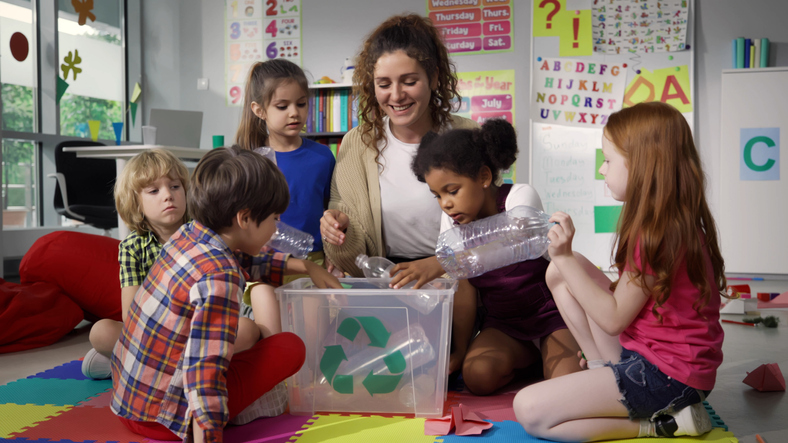Be Thankful, Thank Mother Nature
By Jess Winn, NIU STEAM Educator
In this blog, Jess offers ideas for project-based learning for grades 6-12 to help students learn about the impact their school has on the environment – and practice making a positive difference. She includes ideas for science, math, history/civics or language arts.
I’m Jess Winn, and I like to call my blog series “Winning Ideas” (get it?). In this episode of Winning Ideas: How often do we take time to really thank Mother Nature for what she provides us? In this month’s edition, where thankfulness is at the forefront, I’m exploring how we can design an environment for sustainability at our school.

How many times have you walked into your school and thought about the waste that surrounds the profession we are in? From paper assignments, to useless bathroom paper towels that never soak up anything, to the barrage of garbage that is inevitably produced each day at lunch…the waste produced by schools is significant. Multiply that by the number of schools across the country, and we have a relatively large impact. How can we as educators inspire our students to consider the number of resources we go through, and their impact on the overall total? How can we find ways to conserve these resources that truly are creating a larger scale issue on the planet?
Now this isn’t your average project – your students’ ideas, once generated, need to be shared to start actually impacting change! Send an invite to your school board members, your administration, city council, and other stakeholders in education. The more you build your project – the better solutions you will achieve.
So how do we start something this grandiose? Start with your goal as a teacher. Is this a history project where students are learning how to write and propose amendments to existing policies? Are you a science teacher looking for ways to have your students examine the human impact on the earth’s climate? Are you an English instructor looking at alternative technical writing assignments? Or maybe you’re a math teacher considering how much garbage is produced on any given day at your school. Whatever lens you approach this project through – be sure you have a clear outcome for your students. If they are going to present in front of stakeholders, they need to be prepared. Give them a lofty goal – you will be surprised at the outcomes they achieve. Give them the tools to be successful – show them how to do technical writing, how to research current policy and the process for suggesting changes, teach them the math they need to know to see how impactful the amount of waste actually is. Whatever you decide, be sure it’s based in fact, it has an actual outcome that can make a measurable difference – and be sure you give them enough time to complete the project.
Once you have your basis set up, start to generate a list of questions for students to think about. Don’t be surprised when they have their own questions, too – let them take ownership of that! If you foster a classroom environment of curiosity, your students will follow suit.

Some things I recommend you consider – does your school have an existing recycling program? Does it have a compost bin? Are there water saving methods in place? Energy efficiency? Is lunch served on reusable trays or in plastic and paper pre-packaged meal trays? Allow your students to select an area where they believe they can create a sustainable change. Be sure to remind them they are all a part of the problem until they are part of the solution. These changes can’t just be the responsibility of the school or district – students need to consider the social impact of change as well. How will the students, teachers and families be held accountable for the changes? How are they getting others involved and on the same page? How do they create a culture of gratefulness for the Mother we all depend on – Mother Earth?
Now just step back and give your students the reins – they need to feel responsible for this project. Allow them the confidence that they can influence others in an outlet other than social media. When they present their ideas that will, hopefully, find traction, take lots of photos, invite their families to share in their successes, and don’t hesitate to celebrate their learning!
Don’t forget to share your projects with us! Tag #NIUSTEAM and @NIUSTEAM for a chance to be featured in our weekly newsletter. Do good things, be good people, and make yourself better than the day before.



